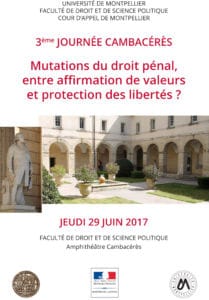Symposium: “Changes in criminal law: affirming values or protecting freedoms?”
This event has passed!
Thursday, June 29, 2017, from 9 a.m. to 6 p.m.
3rd Cambacérès Days
Faculty of Law and Political Science, Cambacérès Lecture Hall, Building 1
 After focusing on contract law reform in 2014 and the El Khomri labor law in 2015, it was decided in 2016 to focus the third Cambacérès Days on criminal law and, more specifically, on "changes in criminal law, between the affirmation of values and the protection of freedoms."
After focusing on contract law reform in 2014 and the El Khomri labor law in 2015, it was decided in 2016 to focus the third Cambacérès Days on criminal law and, more specifically, on "changes in criminal law, between the affirmation of values and the protection of freedoms."
The Faculty of Law and Political Science entrusted the criminal law team in Montpellier, through its director, Professor Marie-Christine Sordino, with organizing this scientific event, in partnership with the Montpellier Court of Appeal.
The declaration of a state of emergency across the country following the serious attacks in France raises important questions that require further consideration.
It is indeed very important that a balance be struck between administrative and criminal proceedings in order to uphold and affirm the values of the Republic and civil liberties. The public authorities have therefore assigned this ambition to the law of June 3, 2016. It aims to express the values to which democracy is attached and seeks to enforce this balance between the judicial judge, the natural guarantor of freedoms, and the administrative judge.
However, these changes in criminal law are not solely due to terrorist threats. The dual trend toward constitutionalization and internationalization of criminal law has contributed to diversifying these sources and modifying the content of the principle of legality of crimes and penalties. This trend has been noticeable for several years now.
The shift from formal legality to substantive legality and the role of judges in interpreting criminal law have brought about considerable change, which likewise invites reflection. Does criminal law, as a vehicle for expressing the values of society, still express the values of the Republic with the same force? Can it still be the protector of freedoms? And what about the principles of necessity and proportionality, which, enshrined in Article 8 of the 1789 Declaration of the Rights of Man and of the Citizen, express the full measure that the legislator must employ?
This day, moderated by academics as well as legal professionals, lawyers, judges, administrative court advisors, will provide an opportunity to explore all these issues in greater depth during the various presentations and roundtable discussions.
The day will be closed by Professor Christine Lazerges, President of the National Consultative Commission on Human Rights.
